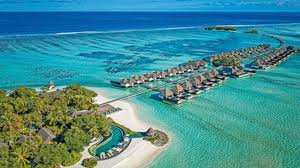
Impact of political stability in Maldives on India
Impact of political stability in Maldives on India
GS-2: International Relations
(IAS/UPPCS)
Relevant for Prelims:
Maldives President Mohamed Muizzu, People's National Congress (PNC), Maldivian Democratic Party (MDP).
Relevant for Mains:
Impact of Political Stability in Maldives on India, India's Concerns, Way Forward, Conclusion.
27/04/2024
Source: TH
Why in news:
Recently, Maldivian President Mohammed Muizzu's People's National Congress (PNC), which is pro-China, won a decisive majority in the country's parliamentary elections.
- In a significant political development, the People's National Congress has won 71 out of 93 seats in this parliamentary elections.
- This victory not only strengthens Muizzu's power within the Maldives, but also signals a significant shift in regional dynamics, which particularly impacts India.
Political context and Election results:
- President Muizzu, who has been particularly pro-China, took advantage of nationalist rhetoric and the "India out" campaign to garner substantial support, in contrast to the pro-India leanings of the Maldivian Democratic Party (MDP).
- The MDP, which earlier held a dominant position in Parliament, suffered a crushing defeat and won only 12 seats.
- This shift is significant because it reflects widespread disillusionment among voters with the MDP's policies, including perceived over-alignment with India.
Impact on India:
- Muizzoo's victory, and his party now having an overwhelming majority in Parliament, could further strain Maldives-India relations. Historically, India has maintained a significant influence in Maldivian politics, viewing the island nation as a major player in its strategic maritime neighbourhood.
- However, Muizu's administration has become increasingly pro-China, as evidenced by pro-Beijing policies and diplomatic engagements.
- This pro-China stance includes key infrastructure contracts awarded to Chinese companies and policy changes reducing Indian military presence on the islands.
- Such steps have not only strengthened China-Maldives relations but also signal a possible realignment in Maldives' foreign policy, which could be seen as a move away from India.
Support of leadership functions:
- Voters' support of his actions since assuming office, including his diplomatic engagements with China, Turkey and the United Arab Emirates, as well as his meetings with senior US officials while maintaining a certain distance from India, underscores the widespread acceptance of his leadership decisions.
Strategic and economic considerations
- For India, the stability and orientation of Maldives' polity is important due to the archipelago's strategic location in the Indian Ocean, which acts as a maritime chokepoint affecting major sea routes.
- New Delhi views growing Chinese influence in the Maldives as a challenge to its regional dominance and a threat to maritime security.
- Economically, Maldives has been a significant beneficiary of Indian aid and investment, which has boosted not only economic development but also socio-political relations between the two countries.
- The current political realignment could impact these economic ties, especially if Muizu's government continues to prioritize Chinese investment over Indian contributions.
Muizzu and his association with India:
Call for army withdrawal:
- Muizzu insisted on the complete withdrawal of Indian troops responsible for humanitarian operations in the archipelago by December 2023, a demand he has since implemented.
Termination of Hydrography Agreement:
- Muizu has terminated a hydrography agreement with India, signaling a strategic shift in favor of strengthening ties with China to achieve a more balanced foreign policy and reduce dependence on external powers.
India's concerns:
- Concerns have grown among Maldivian leaders and commentators about the rise in majoritarianism in India.
Increasing stress:
- The rising tensions are evidenced by the derogatory comments made by Maldivian ministers about the Indian Prime Minister, creating a sense of unease within India.
Decline in Indian tourist arrivals:
- There has been a significant decline in Indian tourist arrivals to the Maldives, reflecting growing diplomatic friction between the two countries.
Way forward:
- Opportunities for India-Maldives relations: With the recent Maldives election results and the impending Indian election results in June, an opportunity has arisen for New Delhi and Male to address their strained relations.
- Pro-Maldives Policy: President Muizzu's claim of preferring a "pro-Maldives" policy over alliance with India or China requires observation,
- They have also had time to demonstrate that their actions do not compromise India's security or regional stability.
- This balance between acknowledging historical and economic ties with India while pursuing closer strategic ties with China will be important in defining the future of Maldives-India relations.
- India, for its part, may need to readjust its approach towards the Maldives, balancing its strategic interests with the need to engage constructively with Muizzu's government.
- Continuing to negotiate and perhaps redefine old relationships may help manage existing complications.
Conclusion:
- The victory of Maldivian President Mohammed Muizzu's party, the PNC, in the recent parliamentary elections has important implications.
- As the Maldives navigates its internal political landscape and its external diplomatic engagements, the outcome of this election is likely to have a lasting impact on regional power dynamics in the Indian Ocean, which would indicate a possible change in the geopolitical allegiances of this strategically located nation.
- President Muizzu has recently taken the initiative to acknowledge India's role and contribution to the development of Maldives, but fundamental geopolitical and strategic priorities appear to be leaning towards Beijing.
- Recognizing and addressing the current bilateral challenges will enable India and Maldives to navigate the complexities of their relationship, leading to a stronger, resilient and mutually beneficial partnership for the future.
---------------------------------------------
Mains Question:
Examine the impact on India of political stability in Maldives and improving relations with China.